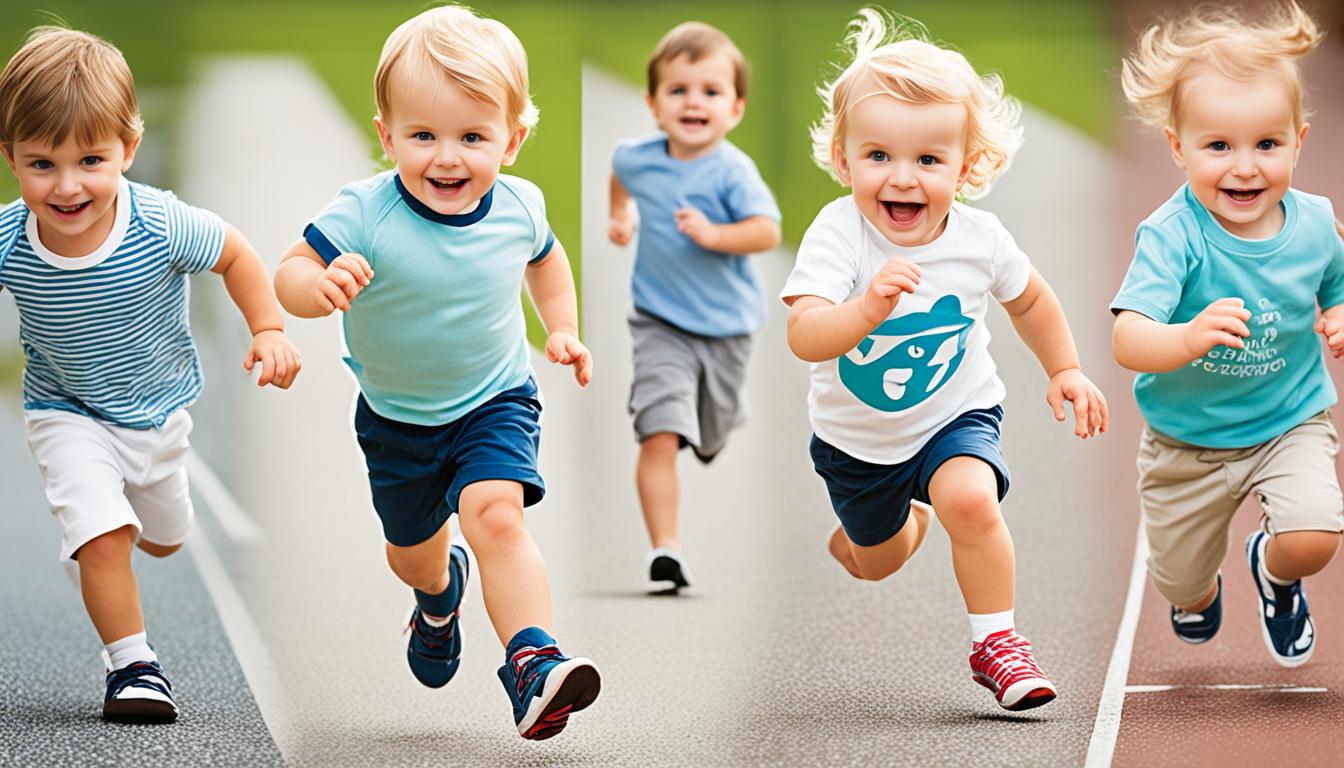Have you ever been amazed by your child’s first step or that special first smile? These moments are huge in child development. They show how your child is growing and changing. From opening their eyes to saying their first words, each milestone lets you see their world grow.
In the first five years, children’s brains make more connections than ever before. This sets the stage for their future learning, health, and behavior. It’s a time of rapid growth, from moving to talking in full sentences. By celebrating these stages through play, healthy eating, or positive parenting, you help your child’s future.
Keeping track of these milestones is key to your child’s growth. It tells you if they’re on track or if they need extra help. Enjoying each small achievement and making sure they’re growing well is crucial. This approach can spot any delays early, helping your child succeed in the long run.
Key Takeaways
- Children’s brains develop fastest in the first five years, setting the groundwork for future learning and behavior.
- Play is integral to children’s learning and development during early years.
- Healthy eating habits formed in early years can last a lifetime.
- Physical activity is vital for developing motor skills and exploring the world.
- Neighborhood and community support can positively influence child development.
- Developmental milestones usually follow a general order, but each child may hit them at different ages.
What Are Child Development Milestones?
Developmental milestones are key points that show how a child grows in physical, cognitive, social, and emotional areas. They let parents and doctors see if a child is growing as they should or if they need extra help.
“I do it myself!” — At 18 months, kids start to want to do things on their own. They might ignore what others say, get upset easily, and not want to share. They have lots of energy and like to climb stairs as a way to move around.
Developmental milestones cover areas like talking, moving, and handling feelings. For example, a 2-year-old can run and climb well, talk better, but still doesn’t get sharing. Guides on developmental milestones help parents know what to expect from their kids.
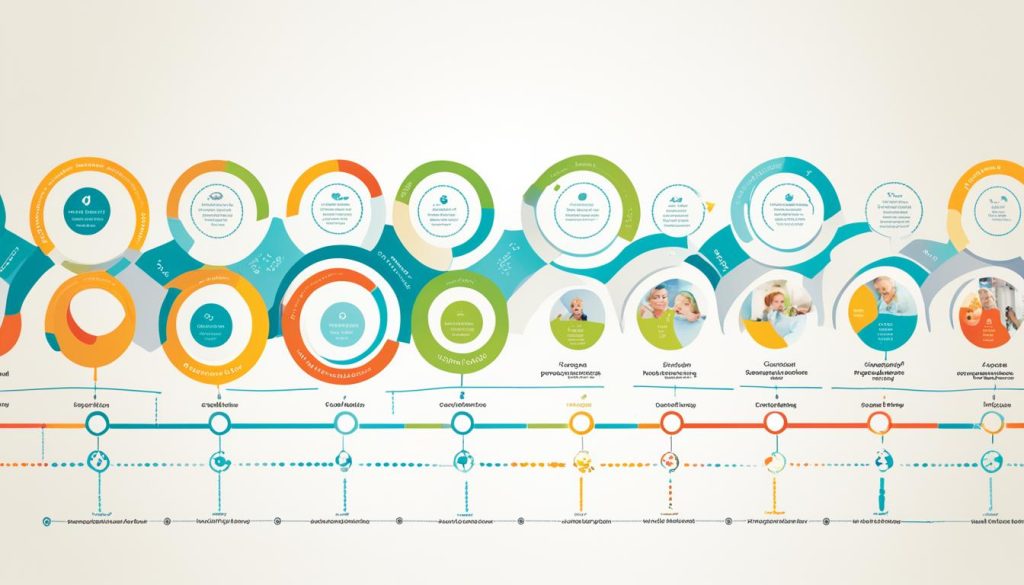
- 18-month-old child: Highly immature emotionally; quick to tantrum, uses “No!” as a chief word.
- 2-year-old child: Demonstrates better coordination and language skills, yet still unable to share.
- 2½-year-old child: Displays impatience and commanding behaviors.
- 3-year-old child: Begins to enjoy sharing, improved motor abilities.
- 3½-year-old child: Shows signs of heightened emotional insecurity, increased questioning and crying.
- 4-year-old child: Exhibits joyous and bossy behaviors, enhanced intellectual development.
Keeping an eye on these milestones is key to helping kids grow. By knowing child learning styles and their growth stages, parents can support their kids better. The Centers for Disease Control and Prevention (CDC) suggest screenings at 9 months, 18 months, and 30 months to check on development.
| Year | Characteristic | Behavior |
|---|---|---|
| 2 | Terrible and Tender | Improved coordination, more patience, yet still unable to share. |
| 3 | Friend or Enemy | Increased motor abilities, loves to conform and say “Yes”. |
| 4 | Out of Bounds | Boasting, bossy, and enthusiastic behaviors, greater intellectual development. |
Learning from these milestones, as shown in developmental milestones guides, helps parents support their child’s growth. A growth mindset for kids encourages them to keep learning and growing. This builds resilience and a love for learning.
Importance of Tracking Developmental Milestones
Tracking child development milestones is key to understanding a child’s growth. It helps parents see if their child is on track. This way, they can spot any delays early and act fast.
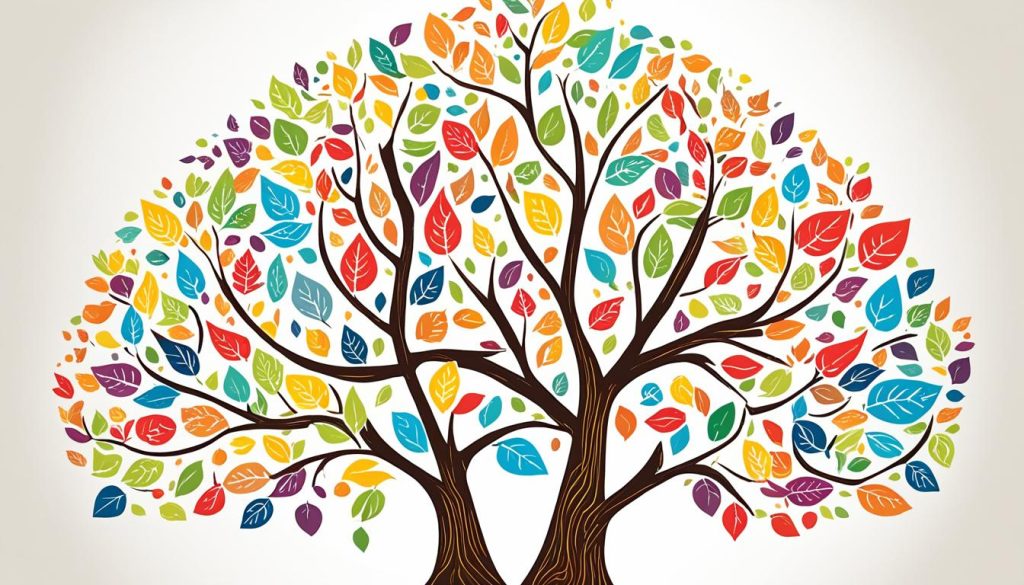
Why Monitoring Is Essential
It’s vital to keep an eye on child development milestones for early help if needed. This method shows a child’s health and growth, spotting delays early. The Milestone Tracker app by the CDC helps parents track their child’s progress from two months to five years.
This app has checklists, photos, and videos to make tracking easy. Parents can share summaries with doctors, get reminders, and find activities for their kids. There are also worksheets in English and Spanish for tracking.
- The app provides personalized milestone summaries that can be shared with healthcare providers.
- Parents receive appointment reminders and suggested activities for their kids.
- Printable milestone worksheets are available in English and Spanish for easy tracking.
How to Observe Milestones
Watching how kids play, learn, speak, act, and move helps track milestones. The CDC’s Milestone Tracker app is a great tool for this. Key areas to focus on include:
- Physical Development: It’s important to watch for physical milestones like head control and walking by 12 to 18 months.
- Cognitive Development: Seeing how kids play pretend and solve puzzles shows their thinking skills.
- Social/Emotional Development: Watching how they interact with others and manage their feelings is key.
- Language/Speech Development: Keeping an eye on language skills, like saying single words by 12 to 18 months, is crucial.
If parents notice delays, they should talk to health experts and look into early help. The Birth to 5 Helpline and groups like Raising Special Kids offer great support. Local schools also have screenings and special education services through Child Find.
Domains of Child Development
Understanding child development helps parents support their kids. It includes language, thinking, and physical growth. Each area is linked, and progress in one helps others. Encouraging hobbies and building self-esteem is key.
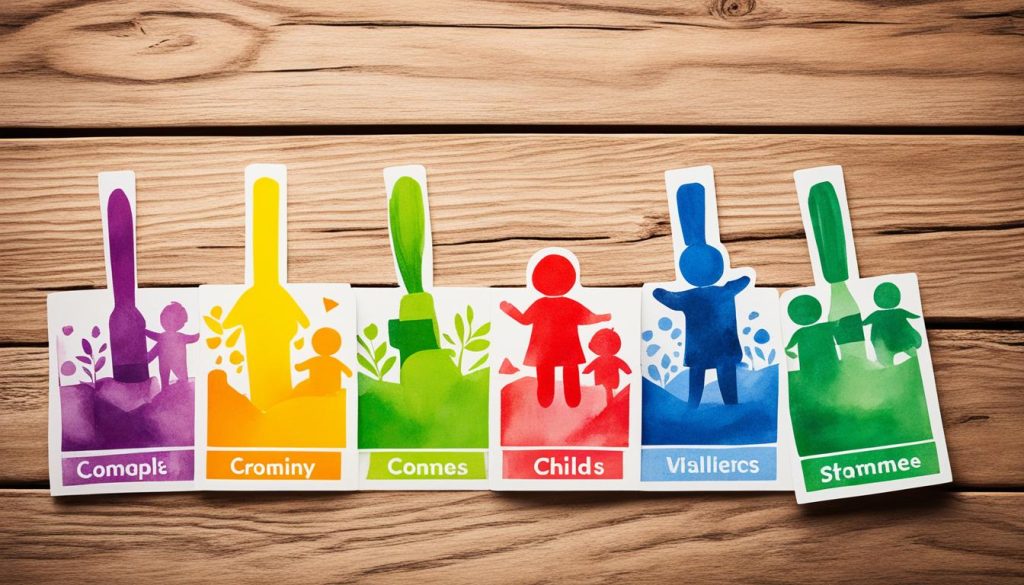
Language/Communication
Language skills start early. This area covers phonology, pragmatics, semantics, and syntax. Reading to kids boosts their language and literacy. It grows their vocabulary and understanding of words.
Talking with kids, answering their questions, and letting them share thoughts helps their language skills. Setting clear rules teaches them how to communicate well.
Cognitive
Cognitive development is about thinking, paying attention, remembering, and understanding the world. Jean Piaget’s stages show how kids’ thinking changes over time. Activities that solve problems can improve their thinking skills.
Letting kids plan and be creative builds their confidence. This helps them feel good about themselves.
Movement/Physical Development
Physical growth includes getting bigger, stronger, and better at moving. Fine motor skills, like using hands and tools, are important. Kids need to move to grow strong and aware of their bodies.
Activities like walking and throwing help with balance and strength. Encouraging these helps kids grow safely and learn to set boundaries.
Early Childhood Development: Birth to 5 Years
The first five years of life are crucial for early childhood development. These years are filled with rapid changes and important milestones. They set the stage for lifelong health, behavior, and learning. Knowing about these stages helps in managing screen time, teaching kids responsibility, and improving parent-child communication. This ensures kids do well in both thinking and social skills.
Brain Development in Infants
Infants’ brains grow fast, making over 1 million new neural connections every second. Early experiences shape the brain’s structure, making it strong or weak for future learning and behavior. By the first year, infants start to understand others’ thoughts and actions, a key part of theory of mind.
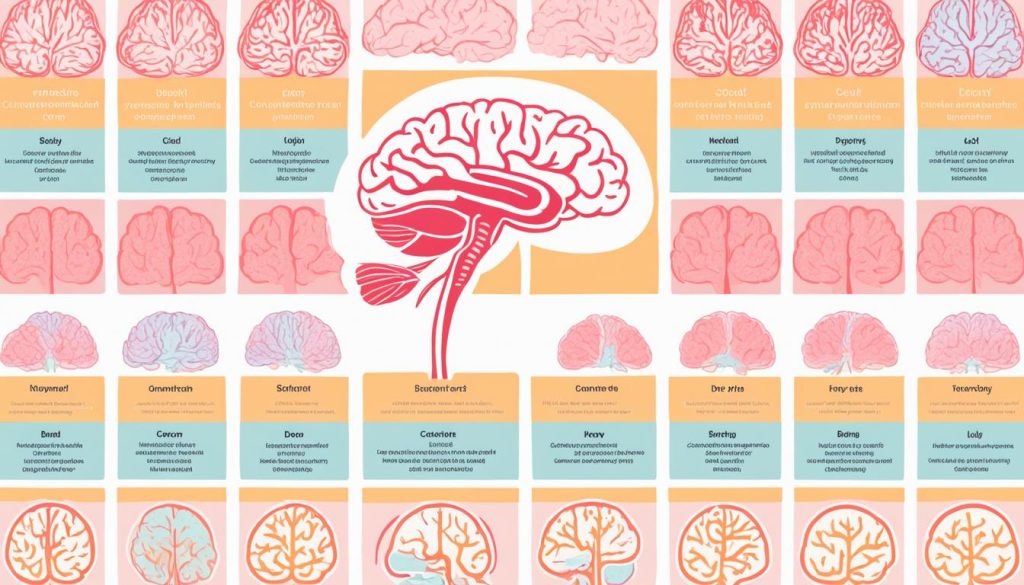
Milestones from Crawling to Walking
Physical growth is key in early childhood. Kids move from crawling to walking in the first two years, showing big steps in movement and physical skills. Parents help by encouraging activities that improve motor skills. This ensures kids develop well without too much screen time.
Language Acquisition
Learning to talk is a big achievement in early years. Studies show that babies start to figure out how language works by listening to speech sounds. By preschool, kids can tell which sources of information are trustworthy. Talking often with your child is key to helping them learn to talk and develop well.
Here’s a look at some important early brain development and what affects it:
| Aspect | Details |
|---|---|
| Neural Connections | Over 1 million per second |
| Role of Early Experiences | Shape brain architecture quality |
| Implicit Theories | Development begins in the first year |
| Language Acquisition | Infants analyze speech regularities |
| Stress Impact | Chronic stress can be toxic |
| Supportive Relationships | Vital for healthy brain development |
In conclusion, the early years from birth to five are crucial for managing screen time, teaching kids responsibility, and improving parent-child communication. These efforts greatly help your child’s overall growth. Being active in these early years can lay a strong foundation for their future health and happiness.
Developmental Stages: Infancy to Adulthood
The journey from infancy to adulthood is filled with developmental stages. Each stage has its own milestones. Infants, from birth to 2 years old, start to learn important skills like moving, talking, and making friends.
Toddlers, from 18 months to 3 years, learn to be more independent. They also deal with tantrums, which are normal at this age.
Children from 3 to 6 years old, in the preschool years, grow physically and emotionally. It’s a great time to teach them about gratitude. They start to understand and show their feelings more.
Children from 6 to 12 years, in the school-age group, keep improving their social and academic skills. It’s important to teach them values and how to get along with others.
Adolescence, from 13 to 18 years, is a big change with puberty and finding their identity. Parents need to guide them while letting them be independent. It’s important to handle their tantrums, which can be emotional or behavioral.
The following table summarizes the key developmental stages:
| Developmental Stage | Age Range | Key Focus Areas |
|---|---|---|
| Infant Development | Birth to 2 years | Motor skills, language development, initial social bonds |
| Toddler Development | 18 months to 3 years | Fostering child independence, managing child tantrums |
| Preschooler Development | 3 to 6 years | Emotional regulation, teaching gratitude to kids |
| School-Age Children Development | 6 to 12 years | Social skills, academic growth, peer relationships |
| Adolescent Development | 13 to 18 years | Identity exploration, balancing guidance and independence |
How Pediatricians Support Child Development
Pediatricians are key in supporting child development from birth to adolescence. They cover many areas that help a child grow and stay healthy.
They focus a lot on supporting child mental health. During check-ups, they watch how a child’s feelings and thoughts are doing. If there are issues, they give parents advice and help for early help.
Pediatricians also help with effective discipline strategies. They teach parents how to encourage good behavior without hurting their mental health. They suggest positive ways to set limits and encourage creativity.
They also help nurture child creativity. They know creative play is important for kids. They suggest activities like art and music to help kids think and feel better.
- Pediatricians are always ready to help in emergencies
- They do lab tests like flu and blood work right in the office
- Give vaccines on a schedule
- Keep an eye on how kids grow and learn new things
- Teach parents about sleep, eating right, and taking care of kids’ health
The Village Pediatric Group in Tuckahoe, NY, is a great example. Doctors like Dr. Heather McGowan and Dr. Sandra Hughes offer full care for kids. They make sure parents and kids feel safe to ask questions and understand treatment plans.
Studies by Hambrick et al. (2018) and Granqvist et al. (2017) highlight the value of early help and strong relationships. The Minding the Baby program by Sadler et al. (2013) shows how good pediatric care can help kids early on.
Pediatricians do a lot, from giving shots to helping with mental health and boosting creativity. Through regular check-ups and advice, they lay a strong base for a child’s future.
Cognitive and Language Development
Cognitive and language skills are key for kids to make sense of the world, solve problems, and talk well. A caring home that focuses on nutrition and growth helps kids learn for life. It also builds respect and empathy in the family.
Cognitive Milestones
Children start learning in their first year and keep getting better. They learn about cause and effect, solve problems, and control their actions. Parents play a big part in this by being supportive and positive.
Warm and supportive parents help kids manage their feelings better and think more clearly.
Table:
| Age Group | Cognitive Milestones | Parental Support |
|---|---|---|
| 0-6 months | Recognizes familiar faces, explores objects using hands and mouth | Provide sensory-rich environments and interact warmly |
| 6-12 months | Understands object permanence, looks for hidden objects | Engage in peek-a-boo and other interactive games |
| 1-2 years | Begins simple problem-solving, follows simple instructions | Encourage exploration and provide puzzle toys |
| 2-3 years | Sorts objects by shape and color, completes sentences and rhymes in familiar books | Read together and offer sorting games |
Combining good nutrition with positive parenting helps kids grow their minds. This prepares them for school and builds resilience.
Language Milestones
Language skills are as important as cognitive skills for kids to communicate and do well in school. From early on, babies start making sounds and grow into complex language users. Talking and reading to kids helps them learn and grow.
Table:
| Age Group | Language Milestones | Parental Support |
|---|---|---|
| 0-6 months | Coos, babbles, reacts to sounds | Talk, sing, and use expressive facial gestures |
| 6-12 months | Begins to say “mama” and “dada,” understands simple instructions | Respond to babbling and name objects |
| 1-2 years | Uses simple words, starts to form sentences | Encourage naming objects and narrate daily activities |
| 2-3 years | Forms two to three-word sentences, follows simple stories | Read books aloud and expand on their words |
Creating a supportive family environment helps kids learn to talk better. This makes them more social and sets them up for success.
Social and Emotional Development in Children
Social and emotional skills are key to a child’s growth. They help kids manage feelings, make friends, and get along with others. It’s important for parents to know how kids grow in these areas.
Understanding Emotional Regulation
From the start, babies show basic emotions like happiness, anger, and fear. By 1-2 months, they smile back at people, starting their social journey. This is the start of emotional intelligence in children.
By 4 months, babies learn to handle feelings with help from others. By 6-12 months, they form strong bonds with caregivers. Learning to control emotions early helps kids deal with sibling rivalry and other feelings later on.
Social Skills Development
As kids get older, they hit important social milestones. By 12 months, they start playing together, like peek-a-boo. At 12 and 16 months, they use gestures to communicate.
Around 15 months, they start to understand others’ feelings and their own. Between 18-30 months, they become more independent. Helping kids reach these milestones teaches them manners and how to get along with others.
According to CASEL, there are five key areas for social and emotional growth:
- Self-awareness: Knowing who they are, their feelings, and being honest.
- Self-management: Controlling their feelings and actions, showing self-control.
- Social awareness: Getting others’ feelings, setting goals, and understanding social rules.
- Relationship skills: Talking well, making friends, and solving problems together.
- Responsible decision-making: Choosing what’s best for themselves and others.
Watching these skills helps in handling sibling rivalry. It also makes for a peaceful home where kids learn important social skills. This helps them get along better with the world.
The Role of Play in Child Development
Play is key to child development, boosting their thinking, social, and emotional growth. It helps kids plan, interact socially, and control their feelings. This leads to better language, math, and social skills. It’s a way to develop healthy habits in kids early on.
Children play less now due to busy family and school schedules, fewer safe places, and more screen time. Finding a balance between work and family is hard, but making time for play is vital. Unstructured playtime lets kids imagine and move freely, which is crucial for young ones.
The American Academy of Pediatrics suggests a mix of real activities and screen time for kids. They say interactive play and social time are better than digital media. Doctors might even suggest a “prescription for play” during check-ups for kids under 2 to stress play’s role in growth.
Play changes as kids get older. Structured play includes sports, dance, and music classes, led by adults. These activities offer a structured setting for older kids. Unstructured play, like building with furniture or making obstacle courses, is key for young kids. It boosts creativity and imagination.
Newborns and babies enjoy music, peekaboo, and tummy time. Toddlers like simple toys like cardboard boxes and chalk. Preschoolers play with things like milk containers and playdough. School-age kids take part in cooking and team sports.
Adding benefits of outdoor play to daily life helps kids handle stress and anxiety. A study found that kids aged 3 to 4 felt less stressed after playing than after listening to a story.
In short, play is crucial for kids’ all-around growth. From babies to school-age kids, play helps balance work and family life. It sets the stage for their future thinking and social skills.
Positive Parenting for Raising Confident Kids
Positive reinforcement parenting is key to raising confident and well-adjusted kids. It’s about creating a supportive space where good behavior gets its due. This strengthens the bond between parents and children. Here are some ways to build a supportive relationship.
Encouraging Positive Behavior
Boosting your child’s self-esteem starts with encouraging positive actions. Set clear rules and praise their efforts and hard work. This approach helps them see the value of not giving up.
Setting goals and working towards them also boosts confidence. Finding the right balance between challenges and successes is crucial. This balance helps kids grow and learn.
Trying new things and learning from mistakes are vital for confidence. Using natural consequences teaches kids from their mistakes. Focusing on specific actions, not just character, brings out the best in them. Giving kids tasks they can handle makes them feel important and capable at home.
Effective Communication Strategies
Good communication is essential for a strong parent-child bond. Spending short, individual moments with your child can greatly improve their behavior. It’s about building a deep emotional connection, not just talking a lot.
Talking openly about different cultures and lifestyles teaches kids to be more understanding and caring. This improves their social skills and broadens their view of the world. Being a caring and responsive parent helps kids manage their feelings and behave better by age 3.
About 6 out of 10 kids in the U.S. have a strong bond with their parents. This bond helps them handle emotions and challenges better. Positive parenting leads to kids growing into confident, caring, and responsible adults.
Parenting and Raising Kids: Tips to Track Milestones
In today’s digital world, tracking your child’s growth is key. Making sure they’re ready for kindergarten or improving their social skills needs the right tools and expert advice. These tools and experts help you navigate each stage.
Using Milestone Trackers and Apps
Now, parenting includes using digital tools like milestone trackers and apps. These tools help you monitor your child’s progress. They let you spot any delays early, so you can act fast.
For example, “Are My Kids on Track?: The 12 Emotional, Social, and Spiritual Milestones Your Child Needs to Reach” is a great resource. It lists important milestones and offers tips to help your child reach them. Apps also make tracking developmental stages easy, ensuring your child stays on track.
Consulting Healthcare Professionals
It’s also vital to talk to healthcare experts. Pediatricians and specialists give personalized advice and check-ups. These talks let you discuss any worries, get expert advice, and make smart choices for your child’s growth.
Knowing how each child grows differently is key. Building a strong bond with your child through empathy and listening helps you tailor your parenting. This way, you meet their unique emotional, social, and developmental needs.
For more tips on supporting your child’s individuality, check out Understanding the Dynamic Relationship with Each. It highlights the value of celebrating each child’s special qualities.
- Digital Milestone Trackers: Offers convenience and real-time tracking.
- Regular Professional Consultations: Ensures comprehensive developmental assessments.
Conclusion
Knowing and watching your child’s growth is key for parents today. Seeing their milestones lets you celebrate their wins and spot any issues early. This helps you make smart choices for their health and growth.
Studies show that genes and good parenting shape a child’s development. A 1996 study found that traits like being anxious or outgoing come from genes but good parenting shapes being careful and friendly. A 2021 study also found that certain parenting actions help shape these traits in kids.
It’s vital to talk openly, support your child’s feelings, and guide them well. Most parents, 86%, believe talking openly helps kids grow emotionally and socially. Using checklists and talking to doctors helps you keep track of your child’s progress. To help your child become confident and capable, mix genetics, good parenting advice, and regular checks on their development.
FAQ
What are developmental milestones?
Why is monitoring my child’s developmental milestones important?
How can I observe and track my child’s milestones effectively?
What are the key domains of child development?
How do the first five years impact my child’s development?
What milestones should my child reach from infancy to adulthood?
How do pediatricians support my child’s development?
What are cognitive and language milestones?
Why are social and emotional milestones important for my child?
How does play facilitate my child’s development?
What strategies can I use for positive parenting?
How can I effectively use milestone trackers and apps?
When should I consult healthcare professionals regarding my child’s milestones?
This post contains affiliate links. If you click on a link and make a purchase, I may earn a small commission — at no extra cost to you. Thank you for supporting this blog and helping me keep the patterns free! Read the full Affiliate Disclosure & Transparency.
